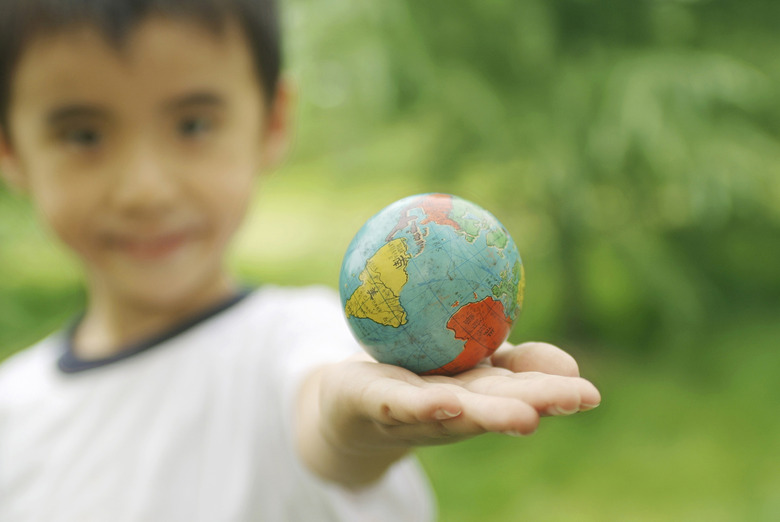Easy Ecology Experiments For Kids
The broad subject of ecological studies offers many opportunities for easy, hands-on experiments and demonstrations. Simple methods and materials can help to illustrate larger ecological issues and phenomena. These examples illustrate stormwater issues, algae blooms, the effect of composting waste instead of landfilling and the intrusion of non-native plants.
Comparing Runoff
Comparing Runoff
Heat can be a form of water pollution, detrimental to aquatic life. This experiment compares hot runoff from sunlit surfaces like pavement to a rain garden, which is designed to collect, slow and cool runoff. Use two disposable baking pans, one holding a "garden" with plants and soil, and the other a "pavement" of ceramic floor tiles. Cut drain holes along the bottom of one side of each pan, and set the pans at a moderate angle so they will drain into shallow tubs representing streams. Heat the tiles in an oven to about 130 Fahrenheit (57 Celsius) to simulate pavement on a hot, sunny day, and set them in their pan. Use two watering cans to "rain" room-temperature water onto each pan at the same time. Compare the amount of runoff and the rate of draining, and measure the temperatures of the drained water in the tubs. The higher temperature in the "pavement" tub represents thermal pollution of streams.
The Effects of Nutrients on Plankton
The Effects of Nutrients on Plankton
Plankton comprises many species of aquatic microorganisms found naturally in water, such as algae. An algal "bloom" is an overpopulation of algae, caused by excessive nutrients in the water. You can demonstrate this by adding nutrients to water. Use two one-gallon jugs to gather untreated water from a local stream or pond, filling both to half-full from the same source. Divide a half-gallon of distilled water into two batches. In one, mix a high-phosphorus soluble fertilizer to 1/10 of the strength called for in the instructions. Pour the plain batch into one of the jugs, and the fertilizer mix into the other, leaving them 3/4 full and uncapped. Place the jugs where they will get some sunlight, and examine the difference in the growth of algae over time. The fertilized algae should grow at a much faster rate, representing a bloom.
Landfilling of Compostable Material
Landfilling of Compostable Material
Organic material can decompose to topsoil in a compost heap, but not when it's buried in a landfill. Make a blend of materials that could be put on a compost pile, such as leaf litter and vegetable trimmings. Obtain two plastic five-gallon buckets or similar containers. Drill several drain holes into the bottoms. Fill both buckets to 3/4 full with the compost mix, and gently press it down. Cover one bucket with a coarse mesh to keep the contents inside and animals out. This simulates a compost pile. Pack the other bucket firmly with soil, preferably clay soil, to bury the compost. This simulates a landfill. Set them out where they will get rain for a month or two. If the weather is dry, water them occasionally. Then remove the mesh and the packed soil, and compare the contents. Evaluate them for deterioration and activity by insects and worms. The open compost should be well decomposed, while the buried compost should show little change.
Surveying Native and Invasive Plants
Surveying Native and Invasive Plants
Choose a "weedy" spot on the school grounds, or in a park, where it looks like several different plant species are growing. With stakes and string, cordon off one or two square yards. Use a wildflower field guide to identify and inventory the plants within the cordon. Record the species found, and the number of each one. Using the range distribution maps in the guide, or online sources, determine how many of the plants you found are not native to your area. Observe the non-native plants to see if they are hosts or food sources to insects or caterpillars.
Cite This Article
MLA
Silbajoris, Alex. "Easy Ecology Experiments For Kids" sciencing.com, https://www.sciencing.com/easy-ecology-experiments-kids-8486371/. 24 April 2017.
APA
Silbajoris, Alex. (2017, April 24). Easy Ecology Experiments For Kids. sciencing.com. Retrieved from https://www.sciencing.com/easy-ecology-experiments-kids-8486371/
Chicago
Silbajoris, Alex. Easy Ecology Experiments For Kids last modified August 30, 2022. https://www.sciencing.com/easy-ecology-experiments-kids-8486371/
